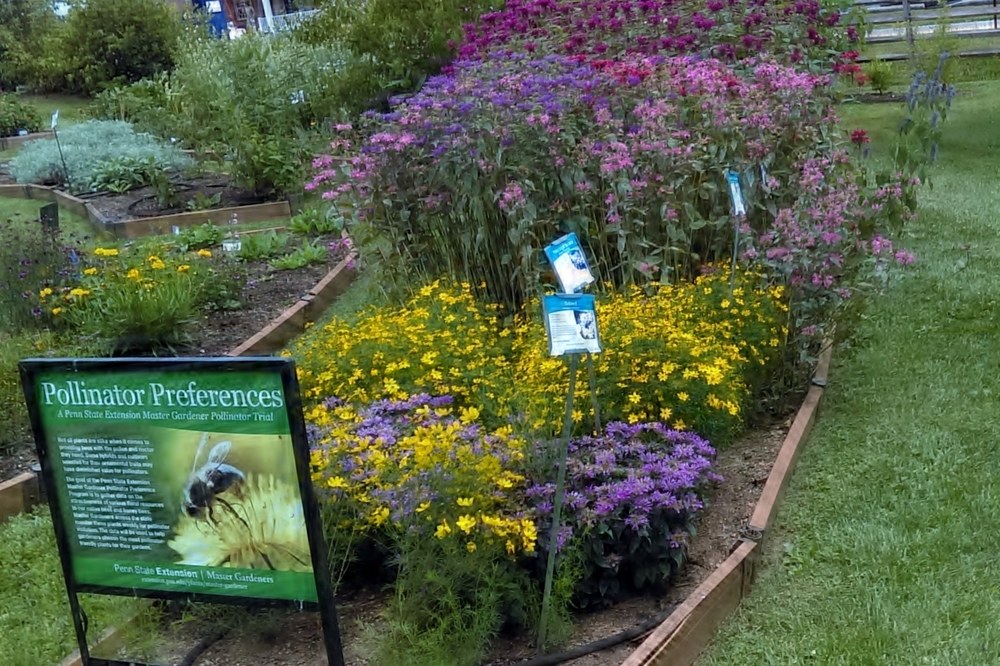Posted: April 29, 2022
If you are a person who visits our Trial Garden frequently you will notice some changes this year: we will be emphasizing three types of plants in the plots--some of the gardeners will plant pollinator plants, some will be planting tea plants, and some will be gardening for children.

A small part of the Trial Gardens, photo credit: Martie Young
The Trial Garden Continues to Evolve
It's always good to embrace change and try new things--and I think that gardeners are particularly good at change. The garden stores and garden literature come out every year with new versions of old plants (think echinacea); there are plants now with very vivid colors: yellow, orange, red, and bicolor pink and green. They are very beautiful and certainly eye-catching. They may not live as long as the tried and true lavender version and they may not pollinate as well but people will find them delightful. Many parts of the echinacea plant can be used for tea. Here are several other plants to use to make tea: three herbs that are native to the Middle East, or Africa, or Asia are borage, marjoram, and German chamomile. These three are commonly found in herb gardens and may also be used in cooking or flavoring. All the mints can be used for tea and there are so many different scents to choose from--my favorite would be Mojito since you can add that to the summery drink and think of the islands!
Another section of our garden will be used for pollinator plants. These will probably be native flowers--plants that have evolved along with insect pollinators over centuries and have grown in North America for hundreds of years. We will try to plant flowers that bloom in each season. Bulbs come to mind and we already have daffodil bulbs in some of the garden plots. There are early bees and other insects that have evolved to pollinate early spring bulbs and witch hazel. During late spring through late summer and early fall there are hundreds of flowers for many different pollinators. When fall and late fall arrive we have goldenrod, asters, and zinnias that are blooming and available to pollinators. During the summer the main pollinators are the many species of bees but in the fall the pollinators are predominately wasps such as yellow jackets and all the different types of wasps. You should not be afraid of bees or wasps in a garden--they are all busy trying to get all the pollen and nectar they need. Yes, a wasp can and will sting you but it is defending its home in the soil or its mud nest in a corner of your roof. It can be difficult to avoid a nest in the ground but as long as you are not barefoot you will probably be fine.
Last on the list of garden types is the children's garden. Several plots will be filled with gardens to entice children and help them learn to love gardening and nature. Our plots have included children's gardens for several years and they are very enticing to the children who visit the gardens. There will probably be an alphabet garden, pizza garden, and maybe a teepee garden to grow pole beans and gourds. The children may also paint rocks to place in the garden. And children can use their imagination to create their own flower. The children's garden will also be used during the summer when we have Explorers' Day Camp.
Several events are planned for this summer's garden: Saturday, May 21 Wellness in the Garden is planned and will include yoga. There will be an Open House in August. The public is welcome at all the gardens during daylight hours and we are anxious to let you discover all the changes in the Trial Gardens for this coming summer.
Upcoming Event: Wellness in the Garden. Join us from 11 - 2 on Saturday, May 21 for yoga, qigong, plants for wellness, tea tasting, light refreshments, and a garden tour. Visit the Workshop website for more information and to register.
Monday videos: Visit us on Facebook, Instagram and TikTok at Penn State Master Gardeners in Adams County for our Master Gardeners' Monday Videos. Timely and relevant topics will be discussed on a weekly basis keeping readers up to date on current horticultural issues.
Master Gardener Hotline is open April through September, on Mondays, Wednesdays and Fridays from 10am - 2pm. Master Gardeners can take your samples on Mondays and Fridays. Please send an email (with pictures if possible) to adamsmg@psu.edu with your gardening questions, or stop by Penn State Extension, 670 Old Harrisburg Road, Gettysburg.
Martie Young is a Penn State Master Gardener from Adams County. The Penn State Cooperative Extension of Adams County is located at 670 Old Harrisburg Road, Suite 204, Gettysburg, phone 334-6271.

